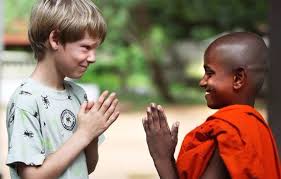
Wish you all a happy new year, Subho nababarsho [Bengali], Sawatdii pimaï [Thai], Hnit thit ku mingalar pa [Burmese], Naya Barsa Ko Hardik Shuvakamana [Nepali], Nav varsh ki subhkamna [Hindi], Iniya puthandu nal Vazhthukkal [Tamil], Suba nava vasarak wewa [Sinhalese]
This is an amazing time every year for many countries in South Asia and Southeast Asia when most of us celebrate the traditional New Year. The New Year is celebrated between 13 to the 15 of April in India, Nepal, Myanmar [Burma], Laos, Thailand, Cambodia, Bangladesh and Sri Lanka.
However, this New Year is perhaps the most significant in our life time as we celebrate it during the pandemic which most of us are experiencing for the first time. Let’s explore the significance of the New Year this year from that context.
In addition to being united by the dates of the celebration that runs across all these countries, all of these cultures have common rituals such as cleaning their houses, cooking fresh new food, dressing in new cloths of designated colours, visiting relations & friends, enjoying traditional music and taking part in religious rituals.
However, this year we realize that we are more similar than different. The virus did not have geographical, ethnic, religious, professional or economic boarders. People earlier divided by these boarders are now getting united. The wars have stopped all over the world. Governments are helping Organisations and people to survive with funds. The senior leaders of companies are taking big pay cuts to ensure the rest of the staff can be paid. Banks are extending payment holidays on loans, reducing interest and eliminating late penalty fees. No amount of money can buy you an air ticket to get home. The playing field is getting more level than ever before and we must consolidate this deep in to our hearts and minds using the traditions of the new year.
The extras and the frills are gone. There are no parties, alcohol and smoking but more nourishing traditional food and drink. There is more emphasis on personal hygiene through frequent handwashing, showers, careful contact with others etc. in addition to the traditional cleaning of houses. Fresh cloths are worn, but not necessarily new or expensive. There may be no visiting of relatives and friends, but families are closer to each other at home or connected through video calls. There is more time for religious rituals, traditional music and games. The music from the birds and sounds of nature are much more prominent and appreciated.
What I hear from family and friends are that they did not miss the extras. They spent less money. They were happier, closer and more healthier. In fact there are reports from the medical circle that people coming for the usual medical treatment and surgeries have significantly dropped. It could be that some are postponing going to hospitals to avoid the risk of infection or they are automatically getting cured due to the new lifestyle.
This is an excellent opportunity for us to remind ourselves to celebrate our diversity and re-discovering our unity not only among human, but also with other-than-human beings. This is the time to reflect on what is important in our lives. My wish is that the pandemic will pass without much destruction to life, but leave us with a better consciousness that will help us maintain this world in the condition it was supposed to be, when it was originally created.
Wish you a HAPPY NEW ERA (this is not a spelling error)
